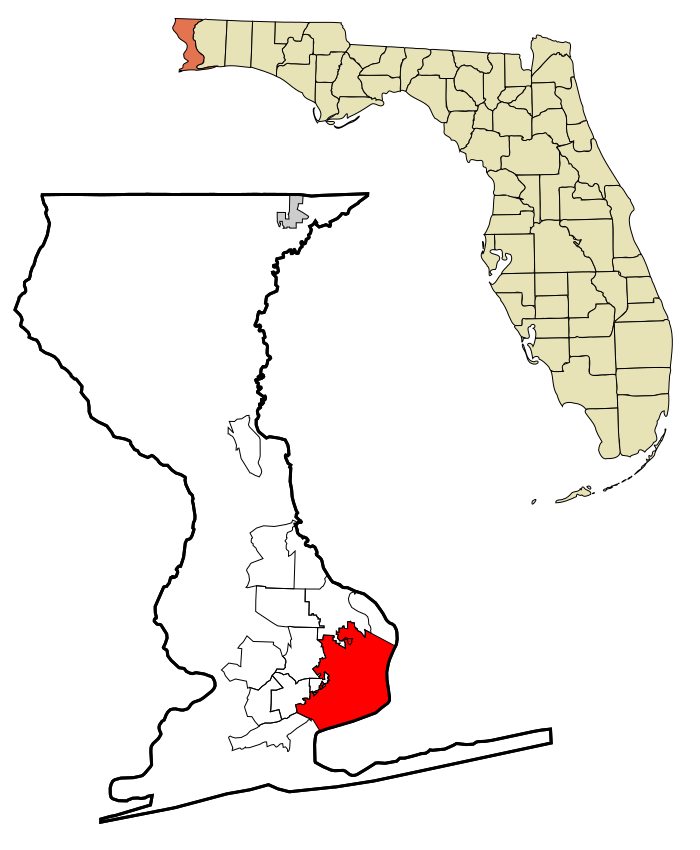Moving to Pensacola, Florida
About Pensacola, Florida

Pensacola ( PEN-sə-KOH-lə) is a city in the Florida panhandle in the United States. It is the county seat and only city in Escambia County. The population was 54,312 at the 2020 census. It is the principal city of the Pensacola metropolitan area, which had 509,905 residents in the 2020 census.
Pensacola was first settled by the Spanish Empire in 1559, antedating the establishment of St. Augustine by six years, but was abandoned due to a significant hurricane and not resettled until 1698. Pensacola is a seaport on Pensacola Bay, which is protected by the barrier island of Santa Rosa and connects to the Gulf of Mexico. A large United States Naval Air Station, the first in the United States, is located in Pensacola. It is the base of the Blue Angels flight-demonstration team and the National Naval Aviation Museum. The University of West Florida is situated north of the city center.
The area was originally inhabited by Muskogean-speaking peoples. The Pensacola people lived there at the time of European contact, and Creek people frequently visited and traded from present-day southern Alabama and Mississippi and southeast of Louisiana. Spanish explorer Tristán de Luna founded a short-lived settlement in 1559. In 1698, the Spanish established a presidio in the area, from which the modern city gradually developed. The area changed hands several times, as European powers competed in North America. During Florida's British rule (1763–1781), dilapidated Spanish-built fortifications were repaired and strengthened.
It was nicknamed "the City of Five Flags", due to the five governments that have ruled it during its history: the flags of Spain (Castile), France, Great Britain, the United States of America, and the Confederate States of America. Other nicknames include "World's Whitest Beaches" (due to the white sand of Florida panhandle beaches), "Cradle of Naval Aviation", "Western Gate to the Sunshine State", "America's First Settlement", "Emerald Coast", "Redneck Riviera", and "P-Cola". Its latest nickname is "The Upside of Florida."
Gender
| Gender | Pensacola | Florida | Country |
|---|---|---|---|
| Female | 52.2% | 51.1% | 50.8% |
| Male | 47.8% | 48.9% | 49.2% |
Gender
Household Income
| Income | Pensacola | Florida | Country |
|---|---|---|---|
| Less than $10,000 | 6.8% | 6.2% | 5.8% |
| $10,000 to $14,999 | 4% | 4.2% | 4.1% |
| $15,000 to $24,999 | 10.3% | 9.3% | 8.5% |
| $25,000 to $34,999 | 10.4% | 9.9% | 8.6% |
| $35,000 to $49,999 | 13.2% | 13.8% | 12.0% |
| $50,000 to $74,999 | 16.8% | 18.3% | 17.2% |
| $75,000 to $99,999 | 13.7% | 12.5% | 12.8% |
| $100,000 to $149,999 | 13.7% | 13.7% | 15.6% |
| $150,000 to $199,999 | 5.1% | 5.6% | 7.1% |
| $200,000 or more | 6% | 6.4% | 8.3% |
Education
| Education | Pensacola | Florida | Country |
|---|---|---|---|
| < 9th Grade | 1% | 5% | 5.0% |
| 9-12th Grade | 6% | 7% | 7.0% |
| High School or GED | 21% | 28% | 27.0% |
| Other College | 20% | 20% | 20.0% |
| Associate's Degree | 12% | 10% | 9% |
| Bachelor's Degree | 22% | 19% | 20.0% |
| Master's Degree | 11% | 8% | 9.0% |
| Professional Degree | 4% | 2% | 2.0% |
| Doctorate Degree | 3% | 1% | 1.0% |
Household Income
Education
Race / Ethnicity
| Ethnicity | Pensacola | Florida | Country |
|---|---|---|---|
| White | 61.8% | 53.4% | 60.1% |
| African American | 25.9% | 15.2% | 12.2% |
| American Indian | 0.1% | 0.2% | 0.6% |
| Asian | 1.5% | 2.7% | 5.6% |
| Hawaiian | 0.1% | 0.1% | 0.2% |
| Other | 0.2% | 0.4% | 0.3% |
| Multiracial | 5% | 2.2% | 2.8% |
| Hispanic | 5.4% | 25.8% | 18.2% |
Race / Ethnicity
- ALABAMA
- ALASKA
- ARIZONA
- ARKANSAS
- CALIFORNIA
- COLORADO
- CONNECTICUT
- DELAWARE
- FLORIDA
- GEORGIA
- HAWAII
- IDAHO
- ILLINOIS
- INDIANA
- IOWA
- KANSAS
- KENTUCKY
- LOUISIANA
- MAINE
- MARYLAND
- MASSACHUSETTS
- MICHIGAN
- MINNESOTA
- MISSISSIPPI
- MISSOURI
- MONTANA
- NEBRASKA
- NEVADA
- NEW HAMPSHIRE
- NEW JERSEY
- NEW MEXICO
- NEW YORK
- NORTH CAROLINA
- NORTH DAKOTA
- OHIO
- OKLAHOMA
- OREGON
- PENNSYLVANIA
- RHODE ISLAND
- SOUTH CAROLINA
- SOUTH DAKOTA
- TENNESSEE
- TEXAS
- UTAH
- VERMONT
- VIRGINIA
- WASHINGTON
- WEST VIRGINIA
- WISCONSIN
- WYOMING
